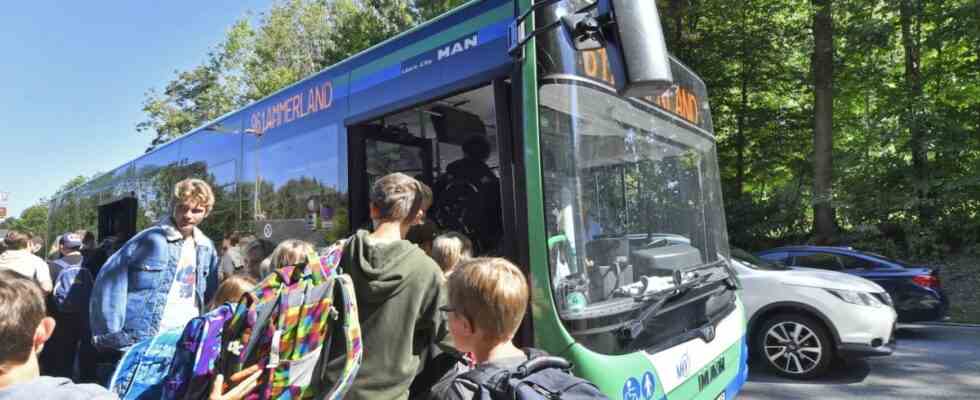The containers at the Deisenhofen S-Bahn station in Oberhaching are already in place. At the beginning of the new school year, the first children will be taught in the new secondary school in Oberhaching on the new school campus, which is still a real temporary solution. However, there will probably be significantly fewer students than the new school could actually accommodate. As of now, says Oberhaching’s Mayor Stefan Schelle (CSU), “with alas” only two predecessor classes come together instead of the planned three – which is partly due to the fact that many parents still send their children to schools that are further away, for example in Holzkirchen im Send to the neighboring district of Miesbach. The district of Munich now wants to counteract this development by only covering the costs of school transport if parents send their children to the nearest school.
Two years ago, the district council decided to cover student transport costs even if the nearest school is overcrowded. The fact that the district committee of the district council is now revising this decision has a lot to do with the new secondary school at the Deisenhofen S-Bahn station; but also with the planned and already decided grammar school in Putzbrunn and the secondary school in Hohenbrunn. “We are implementing a new school offer in three communities,” said District Administrator Christoph Göbel (CSU) in the committee. “The children from these communities should be consciously directed there.”
In the recent past, however, this was not always possible, especially in the south-eastern district. The grammar schools in Neubiberg and Ottobrunn in particular had massive capacity problems before they were renovated or expanded, so that pupils from Aying, for example, could not be admitted and instead went to the grammar school in Holzkirchen – although the municipality of Aying is part of the special-purpose association of secondary schools in the south-eastern district of Munich and co-finances the district’s own grammar schools.
The new school campus is being built at the Deisenhofen S-Bahn station. In the coming school year, the first high school students will be taught there in containers.
(Photo: Claus Schunk)
The secondary school on the school campus in Oberhaching will be the sixth in the district of Munich. According to District Administrator Göbel, this and the new building in Hohenbrunn will close a long-term gap in school planning, especially in the south-eastern district of Munich. This also applies to the new high schools in Aschheim, Sauerlach and Putzbrunn. There will then be state high schools in 18 of the 29 towns and communities in the district.
The Oberland Realschule Holzkirchen still exerts a strong attraction on pupils from Sauerlach, for example, who are taught there because the Realschule in Taufkirchen hardly has any more capacity. Oberhaching’s head of town hall, Schelle, speaks of “habit”. Just two students from Sauerlach have so far been registered at the new secondary school in his community. “The rest are still going to Holzkirchen because of their habit.” According to Schelle, 15 to 20 percent of all students do not attend the nearest school.
The district has built many schools in recent years, and now these are to be used
However, the district of Munich no longer wants to bear the costs incurred for their transport – because it has now built up the appropriate capacities with new schools that ensure that every child also finds a place at the nearest school. And therefore, according to District Administrator Göbel, there should no longer be any false incentives that could encourage parents to send their children to a facility that is further away. Schelle speaks of the fact that “a step backwards into an old justice is now taking place”. According to the mayor, this is how it is handled throughout Bavaria.
The question of whether the transport costs should only be covered for trips to the nearest school was not answered so clearly by all district councils. Green parliamentary group leader Christoph Nadler said that it is of course in the district’s own best interest that its own schools are busy; however, the wishes of the parents must also be taken into account. In addition, according to Nadler, the Bavarian school system is very heterogeneous. Certain branches would not always be offered at the nearest school. Nevertheless, his group also voted for the new version of the regulation, after siblings will also be exempt from it in the future.
SPD parliamentary group leader Florian Schardt, meanwhile, called for the previous regulation to be retained and questioned whether the realignment would actually have a “guiding effect” on parents. According to Schardt, the few cases involved do not justify any further bureaucratic construct in addition to the already complicated regulations of the Free State for school transport. The district office did not provide any information on the expected savings in the district budget that would be achieved as a result of the cut. For hundreds of parents, however, the decision means that they will have to pay for their children’s bus or S-Bahn tickets themselves from the coming school year. That’s a few hundred euros – even before the 10th grade. From this point onwards, the cost-free way to school no longer applies anyway.

